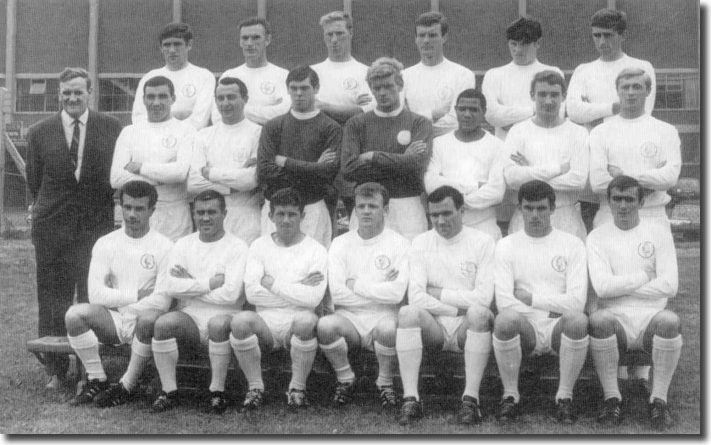 Part
2 - Bridesmaids once more - Results and
table
Part
2 - Bridesmaids once more - Results and
table
Leeds United could bask in reflected World Cup glory in the summer of
1966. Centre-half Jack Charlton
earned a winner's medal as England's defensive rock, while Elland Road
teammate Norman Hunter had been non-playing reserve to skipper Bobby Moore.
Manager Don Revie sought to recruit
another champion as he continued his covert pursuit of Blackpool's dynamic
21-year-old wide man, Alan Ball. Revie had chased
Ball all through the summer of 1965 until Seasiders' boss Ron Suart
put up the 'Not for sale' signs. Undeterred, the United supremo maintained
a clandestine campaign to persuade the player that his future lay in Yorkshire.
Ball: 'I kept receiving anonymous phone calls saying that Don Revie would
like to meet me. One day I drove to a bleak meeting place on the Saddleworth
moors between Lancashire and Yorkshire and met him at a secret location.
He told me he was desperate to sign me, that it was only a matter of time
before I left Blackpool and that he wanted to look after me.
'About ten days after our meeting, there was a knock on the front door.
Lesley answered it. It was a dark, rainy night and there was a man on
the doorstep. He gave her an envelope and said, 'This is for Alan Ball.'
Lesley took the envelope and we counted out £100 in notes.
'It happened almost every Friday and all the man would say was, 'No names,
no pack-drill, here is an investment.' I kept it for a long time. It was
silly of us to even contemplate taking the money.
'I didn't even tell my dad about the money because I am not sure how
he would have reacted. Nor did I tell Ron Suart until he pulled me into
the office one day. He told me there had been a board meeting that morning
and that I had been sold. He said there were two clubs involved and it
would be a British record fee of £110,000. They had both offered that
amount and I could take my pick. I guessed one was Leeds. The other was
Everton. He guessed right when he said that I might want to speak to my
dad.
'Making a decision did not take long. Everton, we knew about. We used
to go to Goodison Park to watch a lot of their midweek games if I was
not involved with playing for Blackpool. I had told him about the envelopes
from Leeds United. He was not impressed and quickly made up my mind for
me when he said: "I would advise you to go to Everton. It's the type
of club for you. It's almost on the doorstep and they don't suffer fools."
'Revie heard about the Everton interest and was on the phone again, almost
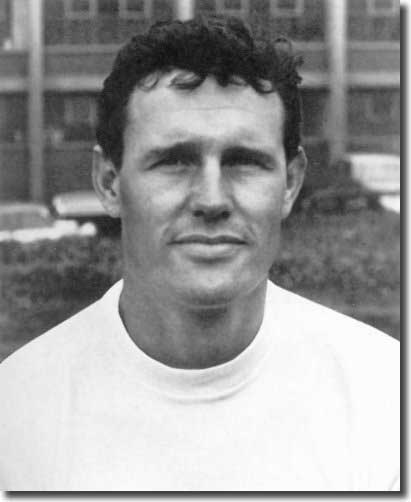 frantic
in his efforts to persuade me to go to Elland Road, but the Balls were
not for turning.'
frantic
in his efforts to persuade me to go to Elland Road, but the Balls were
not for turning.'
Andrew Mourant: 'Revie had been monitoring Ball's progress since he was
a teenager playing for Blackpool reserves. As the Merseyside club came
in with a bid of £110,000 Revie was still struggling to persuade his directors
to go above £100,000. 'Give me time, Alan,' Ball claims Revie said. Revie
was to tell one journalist that he was moved to tears by the extent of
his disappointment.'
Despite his disappointment at the confirmation of Ball's move to Everton
on 15 August, Don Revie had feared the worst for several weeks. He had
seen Ball as the missing piece in his playing jigsaw, but now had to amend
his plans for the new season.
Revie's only dealing in that summer's transfer market thus came in June
with Ian Lawson's £9,000 move to
Crystal Palace. The 27-year-old forward had arrived at Elland Road in
1962, along with Bobby Collins and Cliff Mason, and played his part in
the escape from relegation. Since then Lawson
had slipped down the Elland Road hierarchy and managed just 44 league
games, returning 17 goals. He had often articulated his irritation at
being frozen out of the picture and had been on the transfer list for
some time.
With Bobby Collins now fully recovered
from a broken thigh, Revie restored him alongside Johnny Giles and Billy
Bremner in a middle trio. It entailed a bit of juggling, as Giles had
slotted smoothly into Collins' deep lying playmaker role and there was
conjecture as to how the two could be accommodated without disturbing
the overall rhythm.
There was an early opportunity to try things out in a showpiece curtain
raiser against a Glasgow Select XI at Hampden Park on 10 August. Revie
went with his standard selections for Numbers 1-6: Sprake, Reaney, Bell,
Bremner, Charlton and Hunter; while Collins and Giles filled the inside-forward
slots. The three-man attack comprised the Scots, Jim
Storrie on the right flank, young Eddie Gray on the left and Peter
Lorimer down the middle. There were few attacking options with Mike
O'Grady, Alan Peacock and Albert
Johanneson all out injured.
The blend was not a success, but Giles grabbed an equaliser with eight
minutes remaining after the Scots took the lead in the 73rd minute through
Celtic's Bobby Lennox. As Eric Stanger wrote in the Yorkshire Post,
'Collins and Giles are of a muchness in style, and at times they were
liable to slow down operations in midfield. But, as last season, the chief
trouble with the Leeds attack was that it lacked a cutting edge.'
Of more concern was a leg injury sustained by Jack Charlton after 20
minutes. The setback was just the first in an injury-ravaged campaign
for United. The England defender strained a hamstring in a challenge with
Celtic's Tommy Gemmell and had to limp off. Paul Madeley replaced him
and slotted in smoothly but the in form Charlton would be sorely missed.
Big Jack joined the ranks of those in the treatment room, missing the
opening game, away to big spending Tottenham Hotspur on 20 August.
back to top
Spurs boasted a team costing half a million pounds to assemble. Midfielder
Terry Venables and centre-half Mike England had arrived in the summer
to augment a line up that included players like Dave Mackay, Pat Jennings,
Alan Mullery, Jimmy Greaves, Alan Gilzean and Cliff Jones.
Tottenham were widely regarded as the wealthiest club in the country
and hotly tipped for a championship challenge.
Don Revie would have settled for a point at White Hart Lane. He drafted
youngsters Rod Belfitt and Jimmy
Greenhoff in up front, with Madeley continuing to deputise for Charlton,
as United took the field in their change kit of blue shirts and gold shorts.
It was a sweltering day with little respite from the blazing sun, and
tempers were equally intense. In the opening exchanges, Mackay fouled
Bremner, who retaliated fiercely; Mackay instantly took the law into his
own hands. The moment was captured for posterity and became an iconic
image of football in the 1960s.
Mackay explains, 'The 1963/64 campaign got off to a good start … Manchester
United were our opponents in the first round of the European Cup Winners
Cup … We were only eight minutes into the game when the ball was in their
box and I went charging in for it. Their defender Noel Cantwell was approaching
with equal gusto. I got to the ball and Cantwell got to my shin. I heard
the crack, and so did half the crowd. I did not feel any immediate pain,
but felt panic when I looked down and my foot had twisted 90 degrees.
'I was taken by stretcher into the dressing room and can remember Denis
Law being in there. He sat with me until the ambulance came. The surgeon
told me it was a bad break and it was possible I wouldn't play football
again.
'In September 1964, it was time for me to play in senior games again.
I had been all right in training and practice matches, so Bill (Nicholson)
put me in a reserve team fixture. I cannot tell you the name of the player
who broke my leg this time because I have erased it from my memory. I
was holding up well when he came down on my left leg and broke it again.
Utter bloody despair.
'I was determined to come back because most people didn't think I could
… It took longer than the first break, but I was delighted when the doctors
declared me fit in August 1965. Bill Nicholson boosted my confidence by
making me captain.
'The photograph of myself and Billy Bremner has become one of the most
familiar images of football from that era. I have been asked to sign it
many more times than any other image from my entire career and I have
grown to dislike it. There I am, like Desperate Dan on steroids manhandling
a smaller and terrified-looking Bremner. It smacks of the bully. They
say every picture tells a story and so does this image, but it is not
a real one.
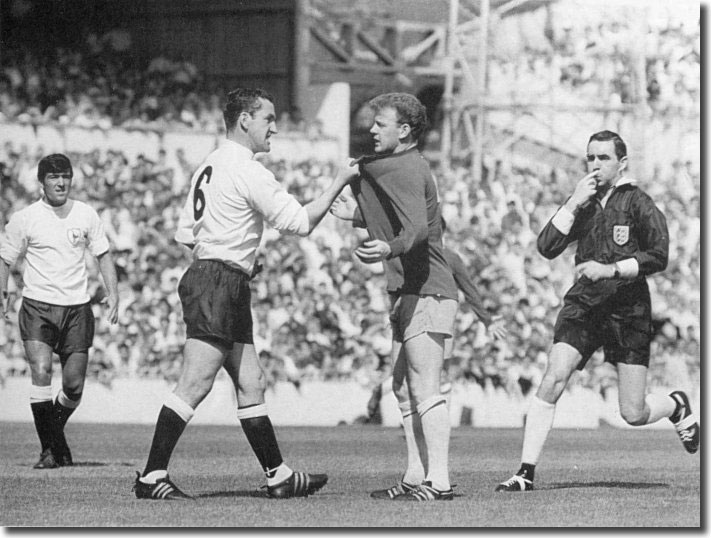 'Bremner
was my pal, but when he pulled on his Leeds shirt on he seemed to become
a different man and for some reason he kicked me on my newly healed bad
leg. He could easily have broken my leg for a third time. I was enraged.
For a couple of seconds I lost my rag and was temporarily capable of breaking
his neck in return. I grabbed him by the front of his shirt and lifted
him from the ground. Our faces almost touched as his legs dangled in the
air. The moment passed, but not before photographer Monty Fresco had captured
it.'
'Bremner
was my pal, but when he pulled on his Leeds shirt on he seemed to become
a different man and for some reason he kicked me on my newly healed bad
leg. He could easily have broken my leg for a third time. I was enraged.
For a couple of seconds I lost my rag and was temporarily capable of breaking
his neck in return. I grabbed him by the front of his shirt and lifted
him from the ground. Our faces almost touched as his legs dangled in the
air. The moment passed, but not before photographer Monty Fresco had captured
it.'
Referee Norman Burtenshaw lectured both players, but booked neither,
merely awarding a free kick to United. Seconds later the two men clashed
a second time as Mackay scythed Bremner down, threatening further confrontation,
but the incident seemed to bring both teams to their senses and things
cooled down a little thereafter.
Leeds took the lead after 13 minutes when Giles headed home a Collins
centre. They just about merited the advantage, but were forced back onto
the defensive by some concerted Tottenham raids.
Giles had suffered a thigh injury in the first minute and was a limping
passenger for most of the first half, restricting United's options. Spurs
equalised after 27 minutes when Leeds failed to clear properly. Mullery
picked the ball up on the edge of the penalty area and fired home with
Gary Sprake rooted to the spot.
The teams were level at the interval with Leeds just about shading the
issue. Giles was replaced by Terry Cooper for the second period and while
they were still sorting out their revised formation, Spurs took the lead.
A minute had gone when Gilzean headed home a long centre from Mullery
that Sprake really should have dealt with.
United retaliated manfully, with Collins' first time shot coming back
off the bar. The restored skipper was in fine form, as reported by The
Sun's Peter Lorenzo. 'By rights Bobby Collins should have been one
of the spectators at Tottenham, but on a day when most came to applaud
the £585,019 skills of Spurs, they were caught in mid cheer and left to
marvel at the stamina, snappy aggression and superb skills of Collins.
What an amazing man! What a courageous example for any footballer, at
any level! In a game that should have been dominated by England, Venables
and their high priced buddies, the man of the match accolade was won hands
down by a pocket sized dynamo, a player small in everything but heart
and ability.'
back to top
Phil Brown in the Yorkshire Evening Post: 'Never in any of the
other games he has played since his injury have I been fully convinced
of the strength of the test for him. There was no quarter for him this
time from what should be a good side. He stood the lot, covered his ground
as the busy deep lying inside-forward in 4-2-4, and was going as well
as anybody (except for dynamo Bremner) and better than most at the end
… I know one match does not make a season, but all of the old Collins
was there again.'
Nevertheless, Tottenham assumed control and took a 3-1 lead after 61
minutes when Jimmy Greaves shot past Sprake while on the run. After that
Greaves and Venables both struck the woodwork, but there 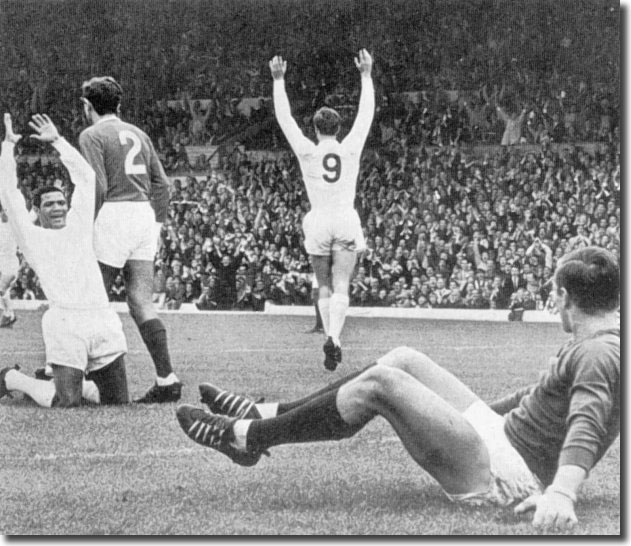 was
no further score. It was United's first opening day defeat for six years,
but they could comfort themselves with a respectable performance in energy
sapping conditions.
was
no further score. It was United's first opening day defeat for six years,
but they could comfort themselves with a respectable performance in energy
sapping conditions.
Giles recovered sufficiently to take his place for the home game four
days later with West Bromwich Albion, and Albert Johanneson was fit to
return on the left wing, with Rod Belfitt making way. Jimmy Greenhoff
switched to the right flank and Peter Lorimer took the No 9 shirt in a
reshuffled forward line.
Giles and Collins dominated affairs in the first half after Leeds took
the lead through Willie Bell inside
two minutes with a speculative effort from the byline. Giles added a second
after 27 minutes. Lack of precision and cool heads up front saw United
waste countless opportunities before Jeff Astle pulled a goal back for
the visitors after John Kaye's shot had struck the crossbar.
Collins was forced off at half-time with an ankle injury. With him went
United's dominance and they paid for their dallying as they were left
hanging on in the second period. Eric Stanger: 'Leeds lost their hold
in midfield and were thrown back time and again by Albion's determined
thrusts. There would have been no need for so much desperate work in their
own penalty area had Leeds possessed one marksman of quality at the time
they were on top, or even if they had had some incisive power on the wings.
The return of Johanneson was scarcely a triumph; Greenhoff had not the
directness or purpose required in a winger and Cooper, who came on in
the second half, had neither the speed nor cleverness to beat his back
on the run. Those problems do not look like being completely solved even
when Leeds are able to field their full strength. Last night they had
again to thank such tried performers as Giles, Bremner, Hunter, Bell,
Reaney and Sprake that West Bromwich were kept at bay.'
Nonetheless, the two points were very welcome as Leeds got their season
up and running. With Bobby Collins ruled out for several weeks, they added
two more from a 3-1 victory against Manchester United at Elland Road.
Willie Bell was at centre-half and Eddie Gray made his first appearance
of the season at inside-right, while Paul Madeley was switched to centre-forward
and headed the opening goal. Billy Bremner assumed the captaincy with
both Collins and Charlton missing and had a decent game, but it was Giles,
back in the deep lying scheming role, who was the star, as Eric Stanger
noted:
'Giles, Mr Revie allowed to run free, and here was the man of a very
fine match. Giles has seldom played better than he did against his one
time club. He was back quickly to cover in defence, he probed unceasingly
in midfield, varying his play with long and short passes, with the one
keeping the uneasy Manchester defence at full stretch by suddenly changing
the direction of the attack and with the other by subtle footwork and
sway of the body making the play in midfield. Giles also had a major part
in the first and the third goals. Gaskell, though, was terribly slow to
get down to Madeley's header from the inside-left's swinging centre and
again he was late diving to Reaney's header from Johanneson's cross which
produced the second goal after 35 minutes.'
The result couldn't mask the fact that the dominance and steamroller
momentum of previous campaigns was missing - Leeds won just once in the
next eight League games and the 3-0 defeat at Aston Villa on 8 October
left them sitting thirteenth. They had yet to field the same team in consecutive
games and had already tried five different centre-forwards - Belfitt,
Lorimer, Madeley, Peacock and Gray. The versatile Madeley was the only
No 9 who had netted - Johnny Giles was top scorer and two of his four
strikes had come from the penalty spot.
A burgeoning injury list and the lack of a proven goalscorer were causing
great consternation and Don Revie was forced to rely on young reserves
in nearly every game. When United drew 1-1 against Burnley on 3 September,
the forward line included 21-year-old Paul Madeley, 19-year-old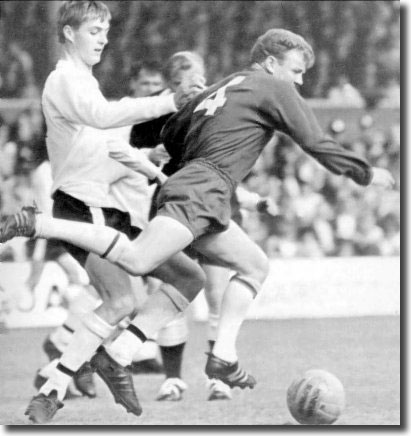 Peter Lorimer, two 18-year-olds in Mick Bates and Eddie Gray, with Albert
Johanneson a positive veteran at 26. The youngsters had proven their worth
with a string of decent performances, but Revie was resigned to going
into the transfer market with Alan Peacock
struggling to recover from the effects of a summer knee operation. He
had played just two League games since January, though he did manage a
goal in a League Cup victory against Newcastle.
Peter Lorimer, two 18-year-olds in Mick Bates and Eddie Gray, with Albert
Johanneson a positive veteran at 26. The youngsters had proven their worth
with a string of decent performances, but Revie was resigned to going
into the transfer market with Alan Peacock
struggling to recover from the effects of a summer knee operation. He
had played just two League games since January, though he did manage a
goal in a League Cup victory against Newcastle.
Many had expected Revie to sign a forward in the summer, but he had wanted
to give Peacock every chance to recover. The shortcomings in front of
goal forced his hand, though, and he put out the feelers for a proven
goalscorer. At various times, Leeds were linked with big money moves for
Aston Villa's Tony Hateley, Bolton's Wyn Davies and Norwich's Ron Davies.
United came close to signing Hateley, but Don Revie baulked at the size
of the fee being demanded by Villa.
Rob Bagchi and Paul Rogerson: 'Revie's perfect centre-forward would have
to meet some pretty exacting criteria. Perversely, the manager wasn't
looking for a predatory goalscorer, someone from the Jimmy Greaves mould.
He wanted someone who was prepared to sweat, to keep running, with the
physique to shield the ball; someone who was dominant in the air, courageous,
unselfish and, above all, persistent. He knew that the others in his team,
mainly the midfielders but also Charlton, would continue to score, so
he needed someone as much to help them score more as to grab 20 goals
a season himself. In Greenhoff and Belfitt he had two players who together
combined all the attributes but individually fell short of Revie's ideal.
'Belfitt was the workhorse personified: a strong runner with a neat first
touch but who lacked pace, power and consistency. Greenhoff was a languid,
graceful striker who seemed to glide through games. The fans loved him,
as they always love those whose skills are unattainable. Some looked at
Belfitt and thought, 'I could do that.' Everyone knew that what Greenhoff
had was out of their reach. Nonetheless, their records were similar and
though, of course, Greenhoff went on to have a good if not great career,
it was Belfitt who came closest to fitting Revie's requirements. He was
the prototype Mick Jones.'
Revie spoke at the time of his commitment to developing his home grown
talent, adding, 'I am not, as the club stands at present, going into the
transfer market to buy big … I have no regrets about not getting Hateley,
not at £100,000. I should not have served United well by having them pay
a fee like that. If people get hot under the collar about it, well, they
will just have to. I have my own reasons for not joining in the hunt for
various other players, too, but they must remain private.
back to top
'I am not attacking these new high transfer fees. They have their own
value to football. But there is a right price and a wrong price for every
player … I have to make my mind up on the right price, and I do. I can
be wrong, like anybody else, but stand by my own opinion I must.
'If we went out buying established players, left, right and centre every
time we showed a weakness, what would be the effect on the youngsters?
… From being unknown boys or young men the staff here had brought Gary
Sprake, Willie Bell, Norman Hunter and Billy Bremner on to full internationals,
and Paul Reaney to near international.
'If we win something this season, well and good. If we don't it is not
the end of the world. The club is in better shape than ever before. My
aim is to keep it that way, and one of my methods is not to pay unrealistic
transfer fees or buy unsuitable players.'
It was as much a case of post event rationalisation as a matter of principles,
but in the end Revie settled for the promise of Greenhoff, the up and
coming former wing-half, who had done enough to convince the manager that
he was worth persevering with.
Richard Ulyatt wrote in the Yorkshire Post: 'Greenhoff has … suddenly
proved that the talent he has fleetingly shown during the last five years
was not illusory. Let us hope that he is not now restrained by too much
advice or by instructions to play to a pattern. A good old stop-at-nothing
centre-forward is what this over coached game needs more than anything
else.'
Greenhoff wasn't an immediate success, though he topped off the scoring
in an impressive 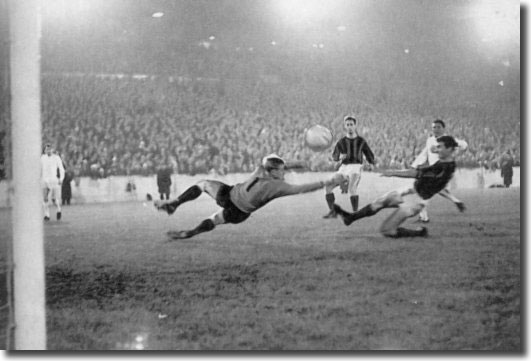 3-1
victory away to DWS Amsterdam when United kicked off their Fairs Cup campaign
following a first round bye.
3-1
victory away to DWS Amsterdam when United kicked off their Fairs Cup campaign
following a first round bye.
In the Elland Road return on 26 October, Albert Johanneson netted a smart
hat trick in a 5-1 win. It was the highlight of an inconsistent season
for the exciting South African, who missed almost half of the games through
injury. His was a typical experience in a thoroughly frustrating campaign
as player after player succumbed to knocks and bruises.
Jack Charlton's first goal of the season was enough to secure a good
victory at Arsenal on Bonfire Night. United were starting to work their
way up the table and had made it through to the fourth round of the League
Cup where they faced a difficult looking trip to West Ham two days after
the Highbury victory.
'Difficult' turned out to be the understatement of the decade as the
Hammers simply blew United to the four corners of Upton Park with some
breathtaking football. Two days earlier the Hammers had put six goals
past Fulham and they carried on where they had left off.
The Times: 'West Ham United were irresistible … Leeds United,
though cruelly weakened by injury, played with much of their customary
competence, but found themselves outmatched by West Ham's skills, their
wit and their explosive shooting on this mild, misty night. It was a performance
that had the gloss of greatness on it.
'All this has come a matter of days after the West Ham manager, Mr Greenwood,
had publicly announced that he was looking for more northern steel to
stiffen his inconsistent team. Last night we saw northern steel - and
Leeds never sold the game short on effort and pluck - put to flight by
purist southern artistry. West Ham, for all the grace they have brought
to the game in recent years, can never have played better; not since February
1929 have Leeds surrendered seven times. Then they were beaten 8-2 in
a League match - by West Ham at Upton Park.
back to top
'No blame can be put on Leeds' young and comparatively inexperienced
goalkeeper, Harvey. He played bravely and at times brilliantly on a night
when his nerves must have been shattered by the sight of men like Charlton,
Hunter, Bremner and Reaney being taunted mercilessly by the West Ham forwards.'
The Guardian: 'Any ideas Leeds may have had of reproducing their
dour defensive policy of Saturday, when they won grimly 1-0 at Highbury,
were soon dispelled. West Ham took just two minutes to accomplish what
Arsenal had failed to achieve in 90. A protracted cross-field movement
involving Hurst and Boyce ended with Charles in possession on the left.
As the centre came across, Byrne, controlling the ball beautifully in
the already muddy penalty area, had the Leeds defence hesitating, waiting
for a shot. Byrne slipped the ball to Sissons and the outside-left scored
with a shot which evaded Harvey and curled inside the far post.
'Moore immediately emphasised West Ham's mood with a 25-yard free kick
that thudded into the wall just past the left hand post - and now Leeds
found themselves hemmed in their own half through necessity rather than
design. But sheer weight of numbers was not enough to stop West Ham on
this night and just before the half hour they scored a second; again the
scorer was Sissons, and again Byrne's was the brain behind the goal. With
his back to the Leeds net, and challenged strongly from behind by Hunter,
Byrne somehow switched the ball out to Brabrook, waiting on the left.
Byrne's virtuosity had caught Leeds completely unaware and, as Brabrook's
centre came across hard and low, there was no one to stop Sissons side
footing the ball into the net.
'Four minutes later, Sissons completed his hat trick with the simplest
of goals. Brabrook advanced down the line once more and squared the ball
to Sissons, who scored a similar goal to his first. Again the Leeds marking
was faulty, and again Harvey's positioning was awry. Now West Ham were
opening up the Leeds defence almost at will and three minutes before half
time, after the ball had bobbed teasingly in and out of the goalmouth,
Byrne shot, the ball hit Hurst, waiting on the line, and he forced in
a fourth.
'The second half brought no respite for Leeds. Byrne beat Charlton out
on the right wing and sent Hurst through for a fifth goal on the hour.
Eleven minutes later Peters made it 6-0, and two minutes after this, again
after sterling work by Byrne on the right, Hurst became the second scorer
of three in an eventful evening.'
Peter Lorimer: 'I was fortunate enough not to have played that night
through injury, as was our goalkeeper Gary Sprake, whose absence gave
David Harvey one of his first senior appearances. I was at Upton Park,
however, and it was one of those games in which absolutely everything
clicked for the home side.
'None of it was David's fault. It was just that West Ham were simply
awesome. They tore us apart, and it was one of those nights when everybody
heard the result and said: "You're joking. Leeds must have played
all their reserves." Big Jack got a real chasing from Byrne and things
were so bad that Mick Bates, just a kid, was sent on from the bench with
the instruction from Don: 'Right, son, get your tracksuit off, go on and
enjoy it.' Quite how you derive pleasure from something like that is beyond
me and Mick's response of 'Oh, thanks, boss,' just about summed it up.'
Norman Hunter put the disaster down to flawed tactics: 'Two days before
the West Ham tie we had beaten Arsenal 1-0 in a league game at Highbury
with a fluke goal from Jack [Charlton]. The Gaffer had changed our system
for that game - Willie Bell, who normally played left-back, picked up
George Graham in midfield and I was pushed to left-back. The win wasn't
convincing by any means. We stayed in London for the League Cup match.
I was rooming with Johnny Giles and we both hoped the Gaffer would not
play the same system for the Cup game. Unfortunately, he did. He put me
to left-back and told Bell to do a man-marking job on Geoff Hurst.
'I was up against Peter Brabrook - a flying machine - and he just 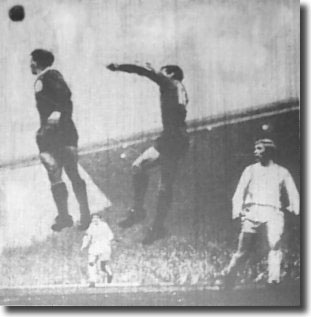 tormented
the life out of me. He simply flew past me almost at will. Johnny Sissons
scored in the first minute and completed his hat trick in thirty-five
minutes - it was one of the finest hat tricks I have ever seen - and Budgie
Byrne destroyed Jack. He kept getting round the back of him. Bobby Moore
got possession and laid off the ball time and again, and we came off at
half time four goals down. The daft thing was that although we had been
battered, we actually felt that we still had a chance of winning the tie.
The Gaffer swapped things around, putting me back in the middle and Willie
Bell at left-back, but we were in disarray.'
tormented
the life out of me. He simply flew past me almost at will. Johnny Sissons
scored in the first minute and completed his hat trick in thirty-five
minutes - it was one of the finest hat tricks I have ever seen - and Budgie
Byrne destroyed Jack. He kept getting round the back of him. Bobby Moore
got possession and laid off the ball time and again, and we came off at
half time four goals down. The daft thing was that although we had been
battered, we actually felt that we still had a chance of winning the tie.
The Gaffer swapped things around, putting me back in the middle and Willie
Bell at left-back, but we were in disarray.'
back to top
Don Revie was not best pleased at the result, though it seemed a mere
blip when two goals by Giles and a third from Greenhoff earned a 3-1 victory
against Leicester five days later. United went to Anfield on 19 November
in good spirits to face third placed Liverpool, confident they could gain
at least a draw.
Unfortunately, disaster struck again and Leeds were blitzed 5-0 by the
reigning champions. It was never as clear-cut as the scoreline suggested
and United were unlucky to go in at the interval a goal behind after Chris
Lawler got a fortunate goal in the 43rd minute. Peter Thompson added a
second after 58 minutes and three further goals in the final 15 minutes
brought an unrealistic look to the final score. As Willie Stevenson remarked
to fellow Scot Billy Bremner at the finish, 'Santa Claus came early for
us today.'
It was a devastating result, prompting genuine fears that United's rapid
rise to prominence had been built on shallow foundations; there was intense
speculation that the Elland Road edifice was about to crumble.
Eric Stanger: 'Was it a seven-goal wonder, or does that thrashing at
Upton Park mean that after three extremely successful seasons Leeds United
are once more about to sink into the mediocrity which all too often has
been their lot in the Football League?
'I imagine many of their followers are asking that question. It was indeed
a seven-goal wonder for I doubt if West Ham will hit such bewildering,
shattering form for many a day, even many a season. They would have beaten
handsomely any side in the Football League.
'At the same time the very brilliance of their football ruthlessly exposed
Leeds United's current weaknesses. All season there has been a suspicion
that the defence which has carried them so far is not as tight as it was
though, in truth, it had been tight enough at Highbury two days previously.
But against the best it is more vulnerable than it was, the marking and
covering is not always as close. In midfield there have been several games
in which I have seen them this season when the Leeds passing has been
too slow; the build up altogether too laboured with an over emphasis on
playing the ball back in order eventually to go forward. It enables opposing
defences to mass.
'In modern football you have to do things sharply and decisively or you
are lost against current defensive systems. West Ham showed how by fast
running, quick, accurate passing and hard shooting they can be shattered.
That was the biggest lesson Leeds can learn from Upton Park. If the defence
has been a little below par this season it has been the inability to get
goals that has been the chief failing. Injuries and loss of form have
caused a constant reshuffling of the attack, so far without any one combination
striking one as better than another.
'Five away goals in seven league games and only nine in all away matches
including three against DWS in Amsterdam tells its own story. It might
have been different had Leeds got Ball at the season's start. One day
perhaps it will be possible to tell why they failed after being prepared
to go to £110,000 for him. Over confidence that he would in the end sign
for Leeds was certainly one reason.
'Since then there has been no really concrete move to sign a goalscoring
forward. True, there was an attempt of sorts for Hateley but the club
(rightly, I believe) considered him over valued at £100,000 and recently
Mr 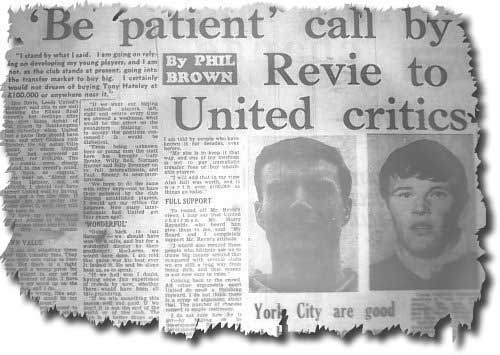 Don
Revie went on record as saying he did not now propose to go into the market.
That statement appears to have upset many of the club's older supporters
who remember more than one pie crust promise by former managers and former
boards of directors.
Don
Revie went on record as saying he did not now propose to go into the market.
That statement appears to have upset many of the club's older supporters
who remember more than one pie crust promise by former managers and former
boards of directors.
'The point is that at the moment there are so few proved marksmen that
when one is on offer the price is grossly inflated. I can understand Mr
Revie's reluctance but in the end Leeds United may be compelled to buy,
however dearly. In the long run Mr Revie may be proved right in thinking
that one or more of his young players like Gray, Lorimer, Greenhoff and
Madeley will supply the answer but none is yet experienced enough. The
stern competition of present day football does not allow time to bridge
gaps - not if you are an ambitious club like Leeds, anxious to stay at
the top. The alternative, it seems to me, is to settle for a transitional
period, and be content with a safe but unexciting place in the table.
I doubt if that would satisfy the Elland Road crowd who after many dull
years have found the wine of recent seasons heady stuff.'
back to top
United gained retribution for their hammering at Upton Park when they
beat West Ham on 26 November. It was a heartening victory, but there were
still difficulties, as reported by Phil Brown: 'Welcome as was Leeds United's
2-1 home win over West Ham United, both as a revenge for the League Cup
hiding and as a general steadier League wise, not over much comfort should
be taken from it. United are not their old selves yet. They were too hard
pressed altogether, and the lateness of Johnny Giles' winning goal - eight
minutes from time - was emphasis on how little there was in hand. Only
a never say die determination to get ahead brought them home against a
first class and equally determined side who, because they were the cooler,
often looked the better outfit. United are on the way back, I am sure,
although only slowly.'
Veteran Scot Bobby Collins was recalled to the side for the visit to
Sheffield Wednesday on 3 December to bring a much-needed boost, though
the game finished goalless.
Even the visit of Blackpool, adrift at the foot of the table, to Elland
Road the following weekend brought no solace. The Seasiders were down
to ten men when Ian Moir was sent off, yet still came away with a 1-1
draw, leaving United in disarray, struggling in mid table.
There were questions to be answered at the club's annual general meeting,
held at Elland Road on December 12, with most concerning the club's inactivity
in the transfer market.
Harry Reynolds and Don Revie were both present and admitted their disappointment
at the team's performances.
Reynolds: 'I think you will agree we are improving and we intend to carry
on with the progress we have already made by the team winning a major
honour. Don't assume that because we have not signed anyone we have not
been trying, but the position is the same as if anyone came for our players.
They would get the same answer as we have received - we don't want to
sell.'
Revie cited injuries to experienced players and pointed out that the
younger players in the first team needed old heads around them. 'When
we introduced Paul Reaney, Gary Sprake and Norman 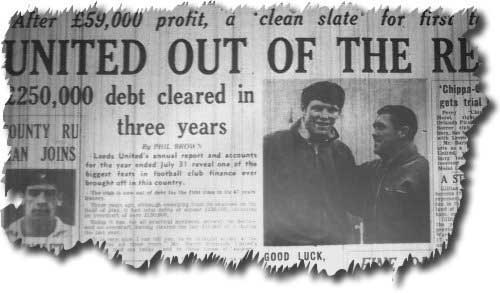 Hunter
to the team a few years ago, there were such as Grenville Hair, Bobby
Collins and Freddie Goodwin to provide that experience. But I still feel
the youngsters will put United on the map. I may be wrong about that,
but I don't think so. There are other youngsters to be found, too - and
we shall go on looking for them.
Hunter
to the team a few years ago, there were such as Grenville Hair, Bobby
Collins and Freddie Goodwin to provide that experience. But I still feel
the youngsters will put United on the map. I may be wrong about that,
but I don't think so. There are other youngsters to be found, too - and
we shall go on looking for them.
'It's no use kidding ourselves - we have just not clicked so far. I don't
make excuses because I don't believe in them. I have always promised 100
per cent effort and the players have always given that.'
At the same time chairman Harry Reynolds announced the financial results
- there was a profit of £59,028, taking the club out of debt for the first
time in its 47-year history. In 1963 Leeds United had owed a total of
£250,000.
Over the previous twelve months gate receipts had risen from £277,519
to £312,398, though payroll costs had climbed substantially, up to a record
£135,265, and there were net transfer outgoings of £13,550, mainly down
to the £30,000 purchase of Mike O'Grady.
Harry Reynolds beamed as he told Phil Brown of the Yorkshire Evening
Post, 'It is very nice to be straight across at the bank. People think
we are rolling in money, and forget we had large debts from years back
to shift. We are doing all right as football clubs go in these days of
increased charges for almost everything, but by the same token at present
we are only breaking even as we go along. We need a gate every fortnight
of about 38,000 just to pay our way through the League programme alone.'
back to top
The rest of December brought better onfield results as United got their
act together. They beat Tottenham 3-2 and then pulled off a League double
against Newcastle, 2-1 at St James' Park on Christmas Eve and then 5-0
on Boxing Day to record their best win of the campaign.
Bobby Collins had been in fine form on Tyneside, but was missing through
injury at Elland Road as United hammered opponents who were sorely threatened
by the spectre of relegation. Billy Bremner led a rout, as reported by
Terry Lofthouse in the Evening Post: 'On Boxing Day, when he was
made skipper in the absence of Collins, Bremner commanded his army in
a manner befitting his international ranking in the soccer world. He,
Gray, O'Grady and Cooper tore the Newcastle defence to shreds.
'This was just the sort of performance to encourage United's oft critical
crowd … and the 40,680 present left happy in the knowledge that United
are still far from out of the title race.'
The year finished with United earning a point from a goalless draw at
Old Trafford on New Year's Eve.
| |
Top of First Division - 31 December 1966 |
| |
Pos
|
|
P
|
W
|
D
|
L
|
F
|
A
|
Pts
|
| |
1st
|
Manchester
United |
24
|
15
|
3
|
6
|
49
|
33
|
33
|
| |
2nd
|
Liverpool |
23
|
12
|
7
|
4
|
43
|
28
|
31
|
| |
3rd
|
Nottingham
Forest |
24
|
12
|
6
|
6
|
36
|
29
|
30
|
| |
4th
|
Stoke
City |
24
|
13
|
3
|
8
|
43
|
30
|
29
|
| |
5th
|
Chelsea |
24
|
9
|
10
|
5
|
46
|
37
|
28
|
| |
6th
|
Leeds
United |
23
|
10
|
8
|
5
|
33
|
29
|
28
|
| |
7th
|
Burnley |
24
|
10
|
7
|
7
|
51
|
40
|
27
|
| |
8th
|
Tottenham
Hotspur |
24
|
12
|
3
|
9
|
43
|
37
|
27
|
| |
9th
|
Leicester
City |
23
|
11
|
4
|
8
|
49
|
40
|
26
|
Eric Todd in The Guardian: 'Leeds would not have been flattered
if they had won. With the wind behind them, they dominated the first half;
facing it they held their own. After Greenhoff retired hurt 20 minutes
from time, they still fought hard for a goal. Manchester, on the other
hand, did not make best use of the wind, and mostly they were inclined
towards congestion and hesitancy. And they did not relish the forthright
tackling and compact covering of a splendid Leeds defence.
'Over the years, Leeds have carried the tag 'dirty.' Not always have
they observed the canons of good behaviour, but for the life of me I could
see no sense nor fairness in Saturday's booing of Bremner before he had
even touched the ball. Plenty is written about provocation and retaliation
on the field, not enough about the crowd's deliberate incitement or victimisation.
'Bremner did more than anyone to contain Manchester's forwards. And Crerand
performed just as effectively on the other side. He needed to because
the Leeds attack - in which I was told O'Grady was in a more determined
mood than he had been in weeks - was fast and resourceful.'
It was a sterling performance, confirming Leeds' return to something
akin to their best form. Recent results had brought them steadily up the
table and, as 1967 dawned, the team were in sixth, just four points behind
the leaders. Not bad going for a side that had been 13th at the beginning
of October, with their title chances written off by Don Revie.
Part 2 - Bridesmaids once more - Results
and table












 Part
2 - Bridesmaids once more - Results and
table
Part
2 - Bridesmaids once more - Results and
table  frantic
in his efforts to persuade me to go to Elland Road, but the Balls were
not for turning.'
frantic
in his efforts to persuade me to go to Elland Road, but the Balls were
not for turning.' 'Bremner
was my pal, but when he pulled on his Leeds shirt on he seemed to become
a different man and for some reason he kicked me on my newly healed bad
leg. He could easily have broken my leg for a third time. I was enraged.
For a couple of seconds I lost my rag and was temporarily capable of breaking
his neck in return. I grabbed him by the front of his shirt and lifted
him from the ground. Our faces almost touched as his legs dangled in the
air. The moment passed, but not before photographer Monty Fresco had captured
it.'
'Bremner
was my pal, but when he pulled on his Leeds shirt on he seemed to become
a different man and for some reason he kicked me on my newly healed bad
leg. He could easily have broken my leg for a third time. I was enraged.
For a couple of seconds I lost my rag and was temporarily capable of breaking
his neck in return. I grabbed him by the front of his shirt and lifted
him from the ground. Our faces almost touched as his legs dangled in the
air. The moment passed, but not before photographer Monty Fresco had captured
it.' was
no further score. It was United's first opening day defeat for six years,
but they could comfort themselves with a respectable performance in energy
sapping conditions.
was
no further score. It was United's first opening day defeat for six years,
but they could comfort themselves with a respectable performance in energy
sapping conditions. Peter Lorimer, two 18-year-olds in Mick Bates and Eddie Gray, with Albert
Johanneson a positive veteran at 26. The youngsters had proven their worth
with a string of decent performances, but Revie was resigned to going
into the transfer market with Alan Peacock
struggling to recover from the effects of a summer knee operation. He
had played just two League games since January, though he did manage a
goal in a League Cup victory against Newcastle.
Peter Lorimer, two 18-year-olds in Mick Bates and Eddie Gray, with Albert
Johanneson a positive veteran at 26. The youngsters had proven their worth
with a string of decent performances, but Revie was resigned to going
into the transfer market with Alan Peacock
struggling to recover from the effects of a summer knee operation. He
had played just two League games since January, though he did manage a
goal in a League Cup victory against Newcastle. 3-1
victory away to DWS Amsterdam when United kicked off their Fairs Cup campaign
following a first round bye.
3-1
victory away to DWS Amsterdam when United kicked off their Fairs Cup campaign
following a first round bye. tormented
the life out of me. He simply flew past me almost at will. Johnny Sissons
scored in the first minute and completed his hat trick in thirty-five
minutes - it was one of the finest hat tricks I have ever seen - and Budgie
Byrne destroyed Jack. He kept getting round the back of him. Bobby Moore
got possession and laid off the ball time and again, and we came off at
half time four goals down. The daft thing was that although we had been
battered, we actually felt that we still had a chance of winning the tie.
The Gaffer swapped things around, putting me back in the middle and Willie
Bell at left-back, but we were in disarray.'
tormented
the life out of me. He simply flew past me almost at will. Johnny Sissons
scored in the first minute and completed his hat trick in thirty-five
minutes - it was one of the finest hat tricks I have ever seen - and Budgie
Byrne destroyed Jack. He kept getting round the back of him. Bobby Moore
got possession and laid off the ball time and again, and we came off at
half time four goals down. The daft thing was that although we had been
battered, we actually felt that we still had a chance of winning the tie.
The Gaffer swapped things around, putting me back in the middle and Willie
Bell at left-back, but we were in disarray.' Don
Revie went on record as saying he did not now propose to go into the market.
That statement appears to have upset many of the club's older supporters
who remember more than one pie crust promise by former managers and former
boards of directors.
Don
Revie went on record as saying he did not now propose to go into the market.
That statement appears to have upset many of the club's older supporters
who remember more than one pie crust promise by former managers and former
boards of directors. Hunter
to the team a few years ago, there were such as Grenville Hair, Bobby
Collins and Freddie Goodwin to provide that experience. But I still feel
the youngsters will put United on the map. I may be wrong about that,
but I don't think so. There are other youngsters to be found, too - and
we shall go on looking for them.
Hunter
to the team a few years ago, there were such as Grenville Hair, Bobby
Collins and Freddie Goodwin to provide that experience. But I still feel
the youngsters will put United on the map. I may be wrong about that,
but I don't think so. There are other youngsters to be found, too - and
we shall go on looking for them.